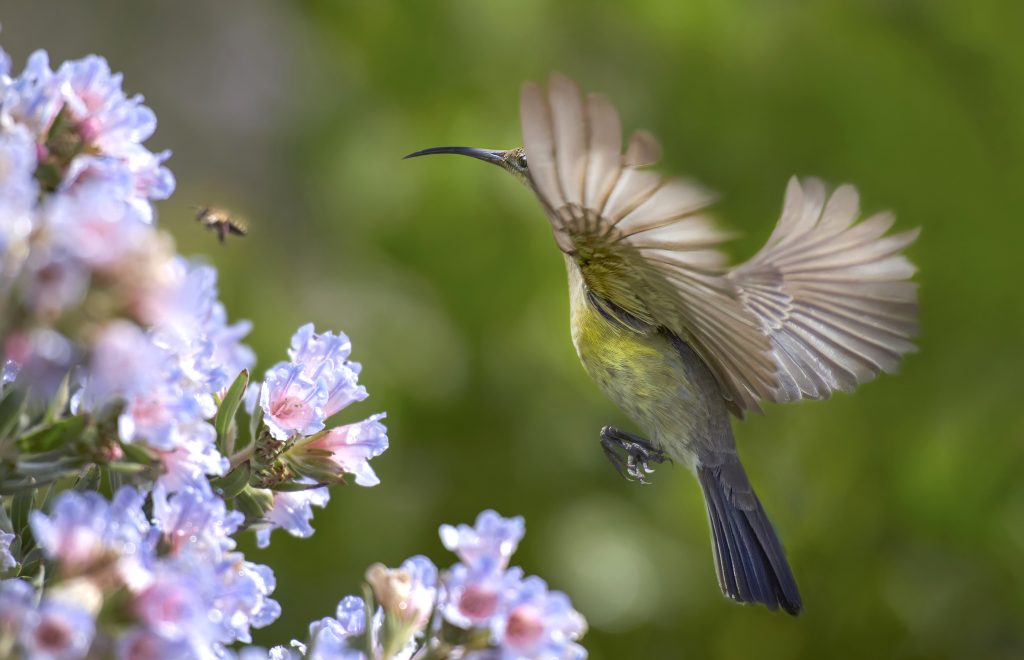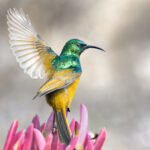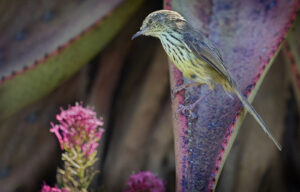If you discover clusters of tiny, soft-bodied insects swarming your plants, chances are you have aphids. But before reaching for chemical sprays, there’s good news: you can control aphids organically without harming birds, bees, or other beneficial wildlife.
Here’s a gentle, effective, and environmentally safe approach to aphid control — rooted in nature.
🧼 1. Insecticidal Soap
A classic and trusted solution.
What it is: A specially formulated soap designed to break down aphids’ outer membranes.
How it works:
- Acts on contact by disrupting the insect’s protective coating.
- Causes dehydration and death — only for soft-bodied pests.
Why it’s safe:
- Targets only soft-bodied insects like aphids, mealybugs, and spider mites.
- Biodegradable and generally safe for humans, pets, birds, and bees (when applied correctly).
How to use:
- Spray directly onto aphids, especially on the underside of leaves.
- Apply in early morning or evening when pollinators are less active.
- Avoid spraying on flowers to keep bees safe.
Note: Always test a small patch first to check plant sensitivity. Some plants (like ferns, gardenias, or cucumbers) may be more susceptible to soap damage.
🧴 2. Cold-Pressed Neem Oil (Organic)
What it is: Oil from the seeds of the neem tree, native to India.
How it works:
- Disrupts aphids’ feeding and reproductive cycles.
- Acts as a long-term deterrent without immediate toxicity.
Why it’s safe:
- Breaks down quickly in sunlight.
- Non-toxic to birds and bees if not sprayed on flowers and applied at the right time (evenings).
Tip: Use only 100% cold-pressed neem oil, not synthetic versions containing concentrated azadirachtin.
🐞 3. Invite Nature’s Helpers: Beneficial Insects
Natural predators that love aphids:
- 🐞 Ladybugs (both adults and larvae)
- 🦋 Green lacewings
- 🐝 Tiny parasitic wasps (e.g., Aphidius species)
These predators help keep the aphid population in check naturally.
Why it’s safe:
- Completely natural — no sprays needed.
- Encourages a balanced ecosystem in your garden.
Pro tip: You can even buy ladybugs or lacewing eggs online or at garden centers for release in your garden.
🌱 4. Companion Planting
A clever way to prevent infestations from the start.
Repellent plants:
- Garlic
- Chives
- Catnip
- Mint
- Marigolds
Trap crops:
- Nasturtiums and calendula lure aphids away from valuable crops.
Why it’s safe:
No chemicals involved — just plant magic!
💧 5. Strong Water Spray
Sometimes, the simplest solutions work best.
What to do:
- Use a strong jet of water from a hose to blast aphids off your plants.
When to use it:
- Best in early morning so leaves dry out by midday.
Why it’s safe:
- 100% natural.
- Harmless to all wildlife, including bees and birds.
🧃 6. DIY Garlic or Pepper Spray
Homemade, non-toxic, and effective.
How to make:
- Blend garlic cloves or mild peppers (like jalapeños) with water.
- Add a touch of liquid Castile soap.
- Strain and pour into a spray bottle.
How to use:
- Spray directly onto aphid-affected areas (avoid flowers).
- Do a patch test to ensure no leaf burn.
Why it’s safe:
- Repels aphids with no harm to beneficial insects or animals.
🚫 What to Avoid
To protect pollinators like bees and animals like birds, steer clear of the following:
❌ Systemic insecticides (e.g., imidacloprid or other neonicotinoids)
❌ Broad-spectrum pesticides, even organic ones like pyrethrins if applied to flowering plants
❌ Diatomaceous earth on or near flowers — it can harm bees by damaging their exoskeletons
🧪 Quick Guide: How to Make Homemade Insecticidal Soap
You’ll need:
- Pure liquid Castile soap (no detergents or fragrance)
- Water
- (Optional) A small amount of vegetable oil for longer shelf life
Basic recipe:
1 tsp – 1 tbsp of Castile soap per 1 liter (quart) of water.
Shake gently before each use.
Spray thoroughly on infested areas, including leaf undersides.
Bonus Tip: You can enhance your soap spray with natural additions like:
- Garlic or red pepper (for extra repellent effect)
- Apple cider vinegar (fungus deterrent)
- BT (Bacillus thuringiensis) or copper fungicide — if dealing with other pests or diseases
🌸 Final Thoughts
Aphids may be stubborn, but you don’t need to harm pollinators to manage them. With some planning, a bit of elbow grease, and the right organic tools, you can protect your garden and preserve the delicate balance of nature.
By choosing bee- and bird-safe methods, you’re not only saving your plants — you’re helping the greater ecosystem thrive.





